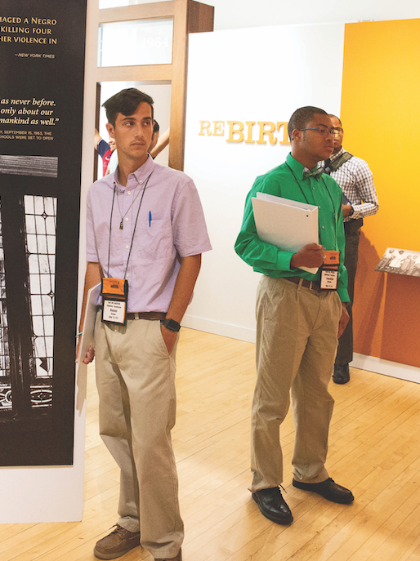If you visited the typical elementary or middle school in Virginia, you might notice that the teachers are mostly women—and that male minority teachers are virtually absent from those classrooms.
That’s what the Call Me MISTER program at Longwood and the young men participating in it hope to change.
“Call Me MISTER’s founding is rooted in the virtual absence of minority males in the teaching force in the early grades,” said Dr. Maurice Carter, director of the program at Longwood. “It is at these grade levels that the importance of male role models is highest, particularly in minority communities,” he added.

Daniel Easter ’22 (left) and Jonathan Brooks ’23 are among the aspiring teachers in the Call Me MISTER program (Photo by Sam Chase ’21).
Dr. David Locascio, associate dean of the College of Education and Human Services, said research confirms the positive impact of male teachers.
“A great deal of research in education points to the powerful role that committed and inspirational teachers play in promoting positive outcomes for the students in their classrooms,” he said. “The research also supports a greater likelihood of these positive outcomes for minority students when at least some of the committed teachers that they encounter on their educational paths are minority individuals themselves.”
Call Me MISTER participants at Longwood— referred to on campus as “Misters”—receive scholarship support, both while they are completing academic coursework and clinical experiences in classrooms throughout the commonwealth. Resources to support participants’ academic success are available, and programming, including a Summer Institute, promotes camaraderie and a commitment to the program’s mission.
“There were high-school students from the Tidewater region, from Cumberland and from the greater Richmond area at the Summer Institute,” said Jonathan Brooks ’23, a freshman who is already an enthusiastic Mister. “We talked a lot about things like influence and empowerment, and the high-school students were already starting to acknowledge and openly accept the responsibility to positively transform their communities through their presence in the classroom, even though that is seven or eight years in the future for them.”
For Carter, the young men are “inspirational.” “Every year at the institute we hear the stories of young men who have come very far themselves,” he said. “It is inspirational for those of us who work with these young men because we recognize how inspirational these stories can be to other young people.”
Locascio said there is great demand for graduates who complete the program.
“Nearly all of the school divisions in Virginia are clamoring to hire our Misters after they graduate,” he said. “There are profound teacher shortages throughout the state, and elementary and middle school, along with special education, are areas where the shortage is most profound. These are the majors of many of our Misters, so they are helping to directly meet the shortages. The Misters graduating from our secondary programs are also very sought-after as teachers because many of our most diverse schools are the ones most directly impacted by teacher shortages at all grade levels and in all subject areas.”
Brooks hopes to have a positive impact on his students once he has his own classroom. “It is my hope that I can inspire all of my students and plant some appropriate images of positive interaction and mutual respect across all races,” he said.


Leave a Comment